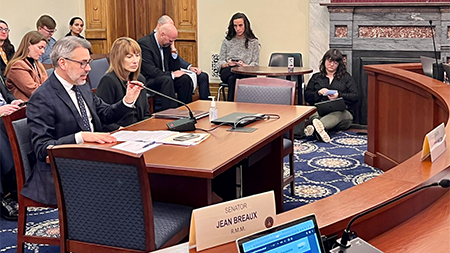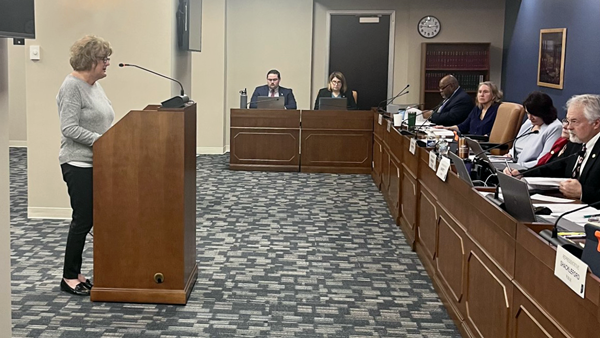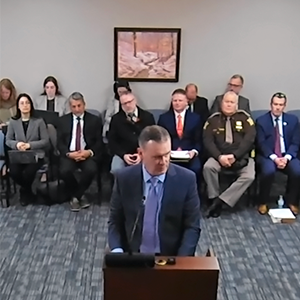
Mid-March marked the beginning of the second half of the 2023 legislative session, which must adjourn sine die by April 29. While defending against harmful legislation and negotiating a beneficial path forward, the Indiana Hospital Association (IHA) legislative team has also been advancing a proactive agenda to improve access to care and support health care workers. Alongside them, hospital leaders from across the state came to the Statehouse to make their voices heard on important legislation that will leave lasting impacts on health care in Indiana. IHA sincerely thanks all members who came to testify and contacted their lawmakers this session.
IHA's 2023 Agenda Bills
IHA's agenda bills, HB 1460 and SB 400, have been heard in committee in their second chamber. IHA's legislative team is actively working to ensure these bills continue to move through the legislative process.
HB 1460 would create additional flexibility for licensing boards to convene for business and would modernize the Professional Licensing Agency's (PLA) licensing process. The goal is for PLA to issue all licenses within 30 days and ensure Indiana's licensing process is not a barrier for individuals entering the health care workforce. To that end, the bill requires PLA to issue full reciprocal licenses within 30 days so long as one license from another state can be verified in that timeframe.
The bill is a product of a Workforce Summit that IHA hosted last fall that included over 65 attendees representing health care stakeholders.
 IU Health West Nursing Director Rachel Culpepper testified in support. “It was a shared goal among the attendees that Indiana's licensing process should never be a barrier to someone entering the health care workforce, and therefore we worked to understand what may be causing delays and how we could address those points," Culpepper said.
IU Health West Nursing Director Rachel Culpepper testified in support. “It was a shared goal among the attendees that Indiana's licensing process should never be a barrier to someone entering the health care workforce, and therefore we worked to understand what may be causing delays and how we could address those points," Culpepper said.
The bill also requires PLA to issue notifications to individuals if their applications are incomplete to assist in expediting the application process. This legislation passed through the House and has been sent to the Senate for further consideration.
SB 400 would require an insurer to submit written justifications to the Indiana Department of Insurance (IDOI) for premium increases, which would then be available publicly. This change ensures transparency in insurer premiums, providing additional insight into Indiana's health care cost drivers. The bill also improves credentialing for providers by removing current barriers thereby getting practitioners in front of patients sooner.
Julie Slinker, Senior Director of Revenue Cycle for Rush Memorial Hospital, testified in support of the bill saying the provisions of SB 400 are necessary to provide immediate, common-sense relief in the area of prior authorization, which will help lessen the administrative burden on providers across the state and ensure Hoosiers get the timely care they need.
immediate, common-sense relief in the area of prior authorization, which will help lessen the administrative burden on providers across the state and ensure Hoosiers get the timely care they need.
“Today, the prior authorization process creates extraordinary administrative burdens that result in unnecessarily high overhead costs and delays in patient care, not to mention provider burnout," Slinker said. “Even when prior authorization is finally issued, retroactive denials of that authorized care still occur frequently – which the prior authorization process was supposed to help alleviate. In fact, prior authorization has become so burdensome, we have been exploring technology to help automate part of the process, but it is a significant expense."
This legislation will positively impact providers and streamline the PA process by:
Requiring urgent PA determinations to be made within 48 hours and nonurgent PA determinations to be made within five business days;
Require a health plan to provisionally credential a provider within 15 days;
Require peer-to-peer reviews for adverse determinations;
Prohibit a clean claim from being altered to only pay for the CPT codes necessary for an individual's final diagnosis if the CPT codes were medically necessary to reach the final diagnosis;
Require full reimbursement rate schedules to be provided.
Additionally, the bill creates a pilot program with the State Employee Health Plan that would prohibit insurers from requiring prior authorization for a certain number of often-approved CPT codes. The bill passed through the Senate and is now being considered in the House.
HB 1059 was IHA's original bill that would enhance criminal penalties for those convicted of assault against individuals who work in emergency departments. The enhanced criminal penalties would match those applied to individuals who assault police officers and the criminal penalties already in Indiana Code for certain health care professionals. Unfortunately, this bill did not receive a hearing in the House during the first half of session. This was due to concerns about expanding the criminal code to cover all the additional people employed by emergency departments across the state.
However, IHA was successful in amending language from this bill into SB 343, which recently passed out of the House Committee on Courts and Criminal Code.
 Larry Tracy, President of Memorial Hospital of South Bend and Chair of the Indiana Hospital Association Council on Quality and Patient Safety, testified in support of the bill.
Larry Tracy, President of Memorial Hospital of South Bend and Chair of the Indiana Hospital Association Council on Quality and Patient Safety, testified in support of the bill.
“Hospitals across the nation and here in Indiana have seen a significant increase of violence and aggression against health care workers," said Tracy. “At Memorial Hospital of South Bend, we have experienced a steady rise, with over 200 workplace violence events reported in 2022 committed by patient, family, or visitors. This violence not only harms the professionals in our emergency departments, but it has both direct and indirect negative consequences on the delivery of timely high-quality care to patients."
Tracy said the increased penalty will not completely solve the problem, but he believes the protections now in SB 343 and the rolling out of IHA's Safe and Sound initiative will be the first step in helping to curb workplace violence in hospitals.
Session Background
In odd-numbered years, the General Assembly enters a budget year, or a “long session," which means the legislature meets roughly over a month longer than a non-budget year. Given the longer timeframe, business tends to be conducted at a slower pace as bills go through the legislative process in the Statehouse.
The second half is similar to the first half in process, but less than half of the bills that were filed at the beginning of session will still be considered. Each remaining bill must go through the opposite chamber's committee hearing process, then any necessary amendments will be added during second reading in the full chamber, followed by a full chamber vote on third reading.
Following this process, surviving bills will go different routes. A bill may be eligible for a concurrence, meaning that the originating chamber agrees with the second chamber's changes and votes one final time for passage. If the originating chamber disagrees with the second chamber's changes to the bill language, then a conference committee is convened to work through the differences. Typically, the differences will be resolved, and the bill will receive a final vote. Some bills, however, will die in conference committee. When a bill receives a concurrence or makes it out of the conference committee, once it receives a final vote in the House and Senate it will proceed to the Governor's desk for consideration.
In order to have a successful legislative session, it is important for everyone to come to the table to increase momentum. IHA is very thankful for the members who took time out of their busy schedules to testify on issues to improve the continuum of care across the Hoosier state.
